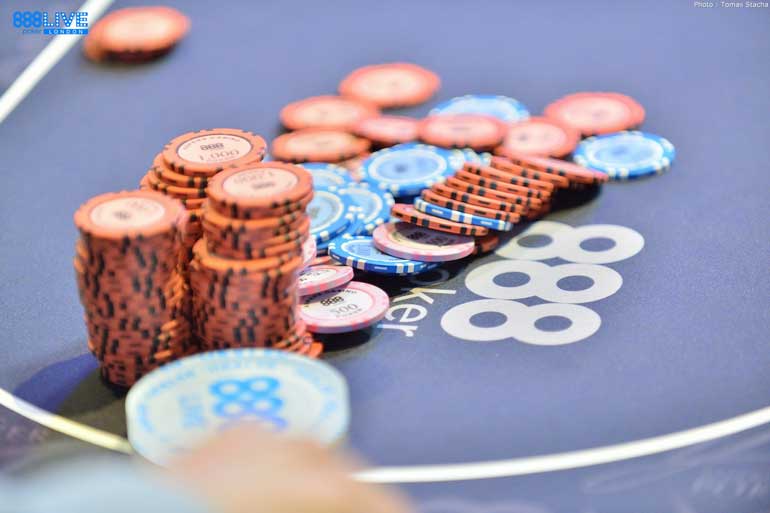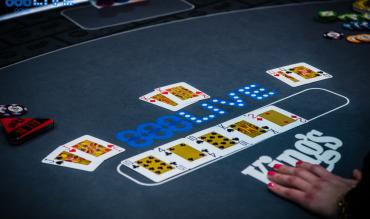During my time as a professional poker player, I have made 8 figures playing online poker tournaments. It’s a lot easier said than done, however. And many poker players get lost along the way.
Here are some of my top tips for succeeding in the world of online poker.
1. Strong Fundamentals Win the Money
If we spend too long watching our favourite poker stars on TV, it can be tempting to try out some of the crazy bluffs. This tactic is often not a good recipe for success.
- Have a strong grasp of the basic fundamentals.
- Be consistent about executing our standard plays.
This method is much more likely to result in long-run profits.
This strategy includes learning basic poker maths. It’s not necessary to be a maths geniusto succeed at poker. But we do need to know the absolute basics, equity, pot-odds etc.
These are not difficult to learn. So, it’s recommended to learn the maths early on.
The more we use these fundamental skills, the easier they will become.
2. Manage Your Bankroll
Just remember, there is always another poker tournament. It doesn’t make sense to take too many big shots. Otherwise, we run the risk of going broke.
I actually recommend mixing in a decent amount of lower buy-in events to help reduce variance. This system has a nice side effect of helping me to focus. I generally find if I single table a big event, I’m more likely to loosen up. I try to play too many hands.
Having the other lower buy-in events running keeps me focused and relaxed.

3. Keep Your Emotions Under Control
Poker can be an intense game. Many players will never make it big because they struggle to keep their emotions in check. Even before we get to the table, we need to make sure that we are in the right frame of mind.
If you are already in a bad mood before playing poker, don’t even sit down at the table.
I’ve generally found that it’s essential to be able to deal with losing and not let it affect us mentally. By the same token, it’s also critical not to let winning cause us to become too proud. Don’t start taking too many shots at higher limit games.
Remember never to quit your day job until you have a track record of consistently winning. Taking down a single event does not make you a professional player.
4. Study in Detail
In the early stages of my career, I basically read every single poker book that I could get my hands on. It helped my game a huge amount. It’s also part of what inspired me to write my book ‘Moorman’s Book of Poker’.
These days there is a huge amount of poker content out there. So, there is really no reason why an up-and-coming player would not have a decent study schedule.
Poker friends can inspire us and help us to learn poker faster. Don’t be afraid to meet people and join study groups to discuss poker strategy and hand histories.
5. Practice, Practice, Practice
Studying is only half of the process. I recommend that you play as much poker as you can and develop good instincts. At first, your bankroll might be small, but this is no barrier to putting in lots of volume.
Consider playing micro-stakes tournaments or even play-money/freeroll tournaments.
The more you play, the better you will get.
6. Game Selection
You don’t need to be the world’s best poker player to make money at this game. You don’t need to be better than those you are playing. We mustn’t let ego get in the way here.
If we feel that we don’t have an edge in a certain environment, we should ideally not be playing.
On a similar note, it’s useful to learn a bit about your opponents, especially those to your direct left and right. These are the most likely opponents we’ll tangle in hands.
It’s often possible to look up our opponents and find out if they are playing their regular stakes games or not.
The more we know about our opponents, the more effectively we’ll be able to play against them.
7. Play to Win!
From the moment I first started with online poker tournaments, I had one goal in mind.
That was to win.
A competitive spirit is essential in this game. So, get ready to give it everything you’ve got.
On a more strategic level, good tournament players are usually shooting for the top three places on the prize board. Most tournament structures are extremely top-heavy.
If we find ourselves trying to min-cash on the bubble every time, we could be heavily limiting our success.
In fact, I often find that the bubble provides a good opportunity to take advantage of opponents who are simply looking to min-cash. They’ll generally fold a huge amount vs preflop steals.
Even better if I can win a few chips before the bubble pressure starts. There is less risk of busting out when playing aggressively on the bubble.
Final Pointers
Experience is key, so don’t be afraid to trust your gut. As you put in more volume, your gut feeling will improve, and you’ll be right more often.
Poker is a complex game, and there is lots of variance involved. It’s crucial not to be results-oriented in the short term.
We shouldn’t get discouraged if we are not making any big cashes. This will come with time.
In the short term, we simply need to focus on improving every day.
Play our best game every time we hit the tables.
